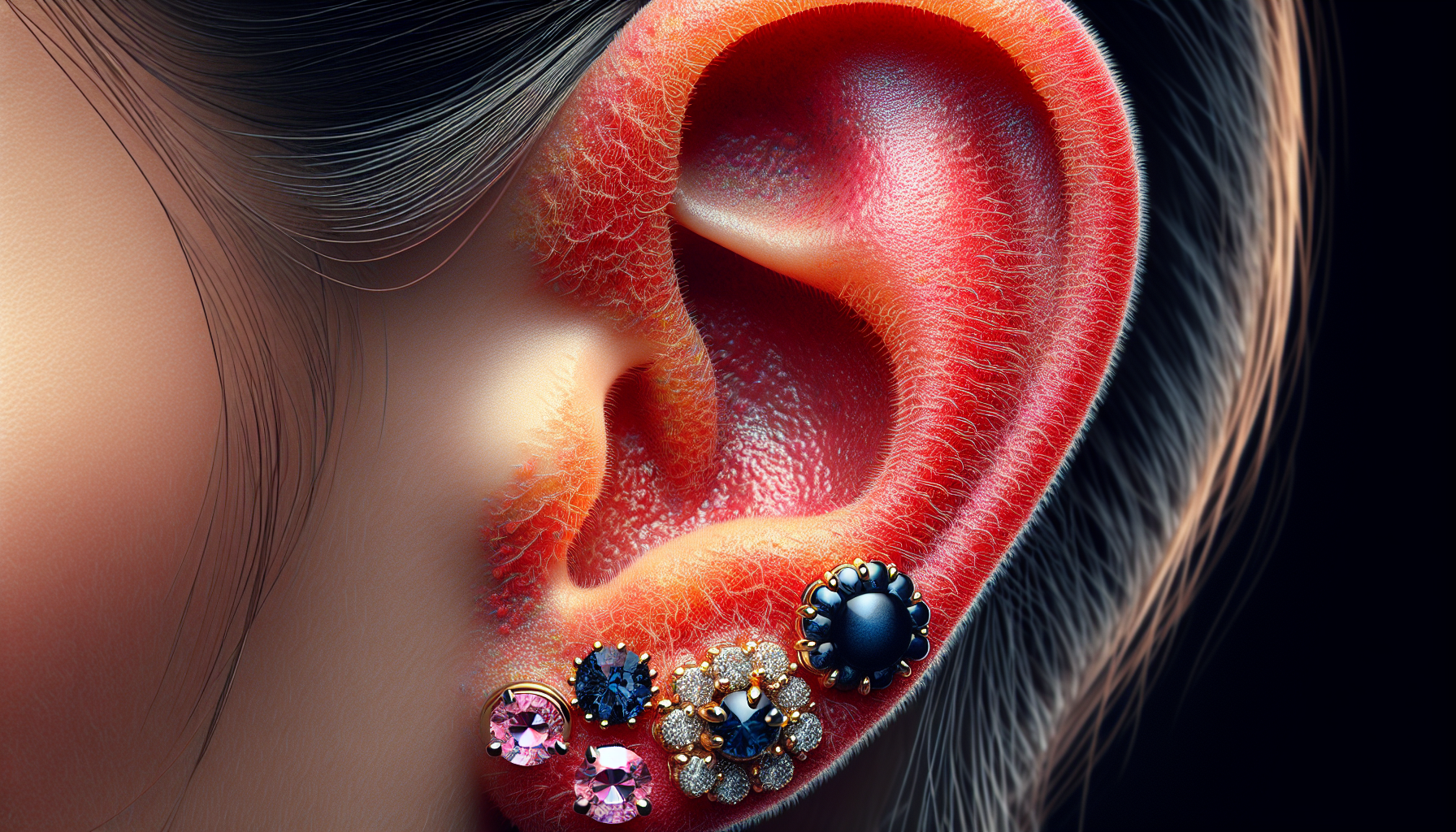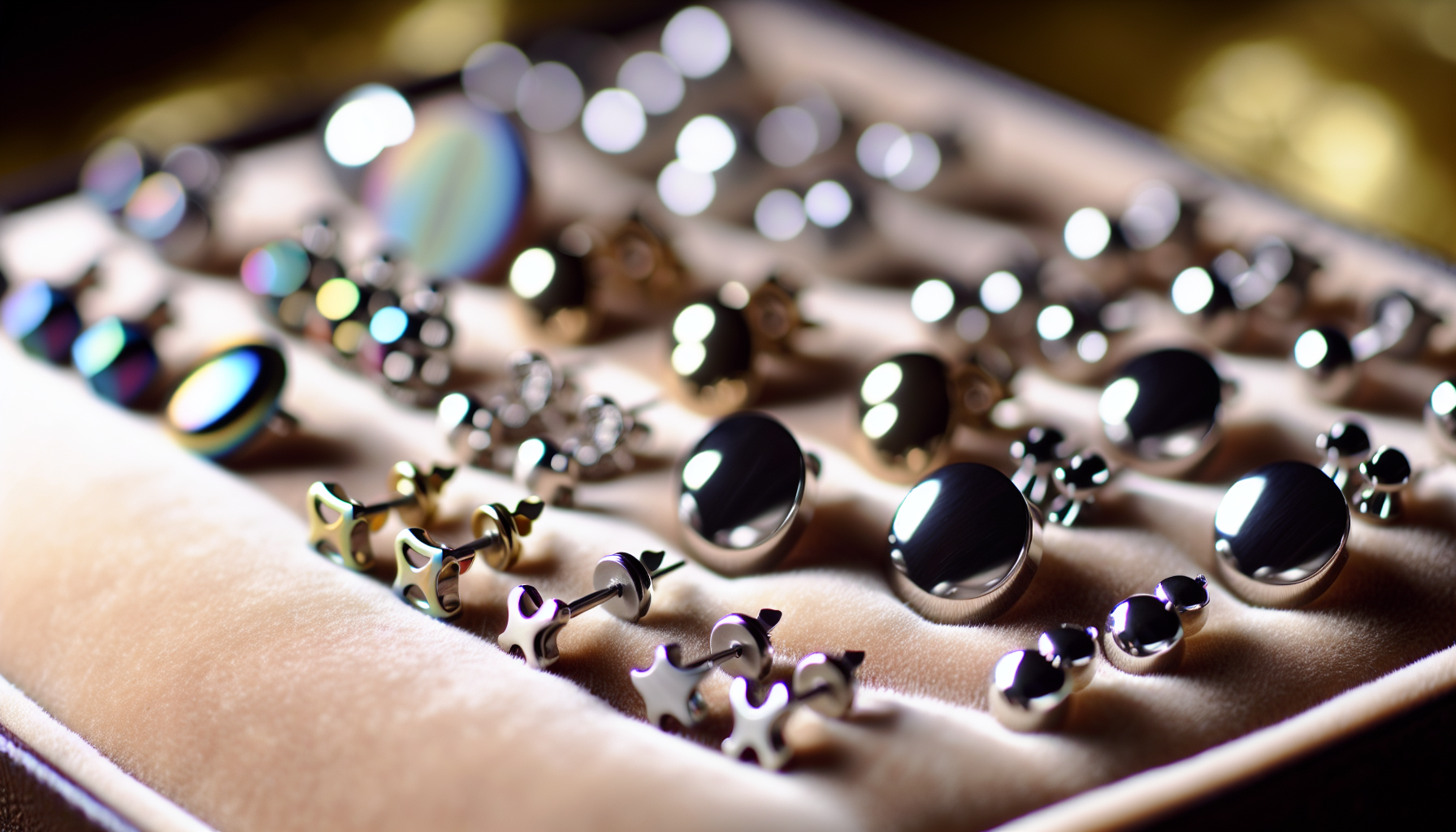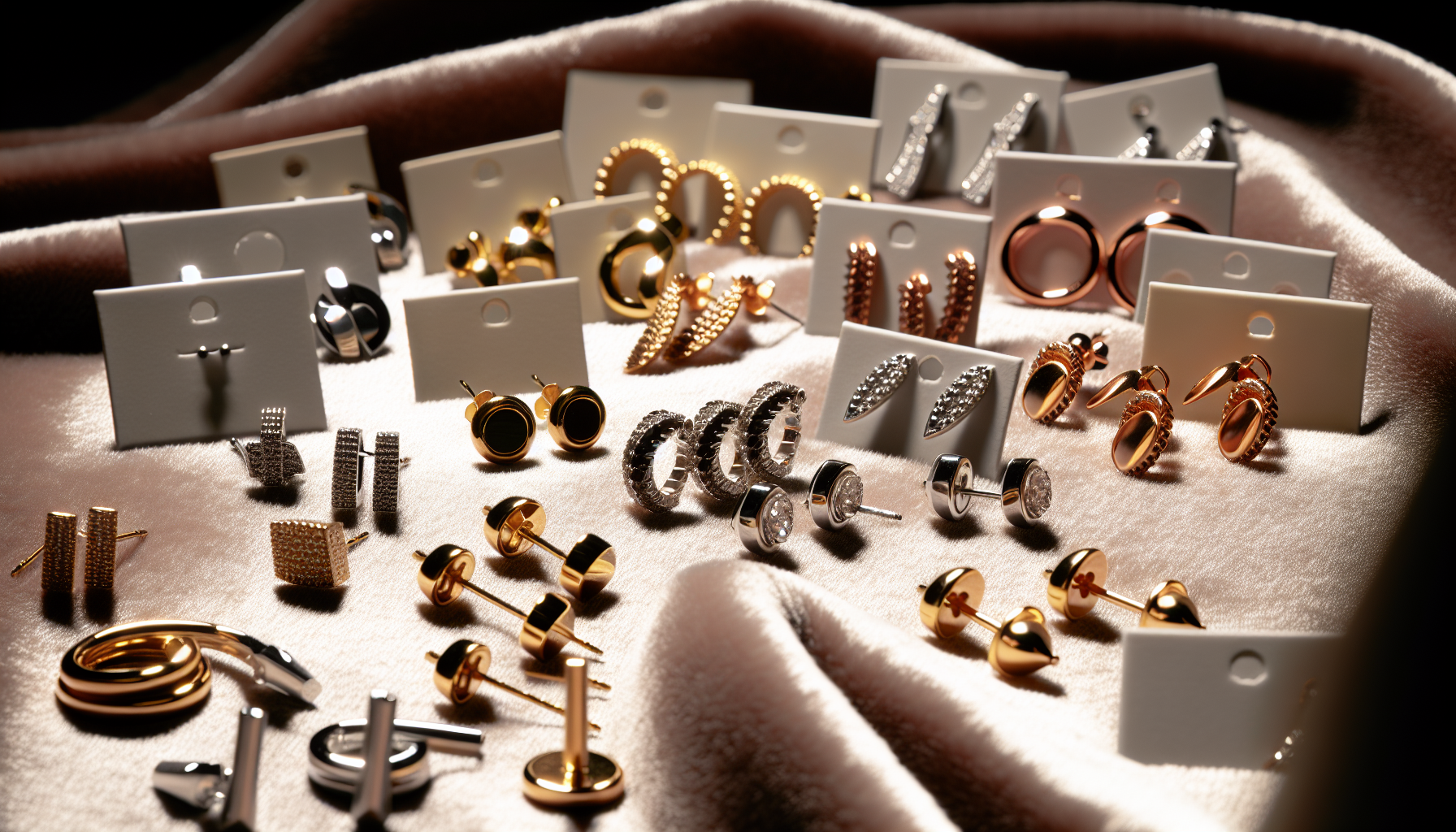List of Best Earrings for Sensitive Ears Without the Irritation
Are you in search of the best earrings for sensitive ears to avoid the irritation and discomfort that often come with wearing jewelry? Look no further. This article cuts straight to the chase, providing you with a selection of earrings made from skin-friendly materials that combine safety with the latest styles. Discover the perfect fit for your sensitive lobes today.
Sensitive ears are often due to metal allergies, with nickel, cobalt, and chromium being the usual culprits; symptoms include rashes, itching, and blisters around the earlobe and piercing area.
Hypoallergenic materials like titanium, niobium, plastic, and certain grades of gold are recommended for those with sensitive ears; however, ‘hypoallergenic’ labels aren’t always regulated, so users should seek explicitly nickel-free options.
To take care of sensitive ears, it’s important to use high-quality hypoallergenic earrings, clean and sterilize them regularly, and use strategies like coating earring posts with clear nail polish or Vaseline to minimize irritation.
Understanding Sensitive Ears and Metal Allergies

Sensitive ears are more common than you might think. It’s not just about discomfort - it’s an allergic reaction to certain metals used in earrings. Imagine your immune system as the overprotective parent, viewing metals like nickel as harmful and causing a persistent sensitivity.
The result? A range of symptoms like:
-
rash
-
severe itching
-
redness
-
blisters
-
fluid drainage
In worst cases, it can even lead to blisters and fluid drainage.
So, why do these reactions occur? Why do your ears turn into a battleground the moment they come into contact with these metals? The answer lies in metal allergies.
Metal Allergies and Their Impact on Sensitive Ears
Metal allergies are the unsung villains for those with sensitive ears. The culprits often include common metal allergens like nickel, cobalt, and chromium. These metals, when in contact with your skin, can trigger reactions, especially in moist environments or with prolonged exposure. And the severity of these reactions can range from delayed allergic contact dermatitis - with symptoms appearing up to 72 hours after exposure - to immediate allergic reactions like contact urticaria.
But there’s hope! Enter hypoallergenic materials like niobium. This highly anti-allergic material is a safer earring choice for those battling sensitive ears and metal allergies.
Identifying Symptoms of Sensitive Ears
Now that we know what’s causing the discomfort, how do you know if you have sensitive ears? It’s all about keeping an eye out for the symptoms. These can range from redness, itching, and swelling around the earlobe or piercing area, to the appearance of bumps or blisters around the same area.
Sometimes, skin conditions such as rashes or eczema can emerge around the earlobe or piercing area, indicating an allergic response to earring materials. Allergic contact dermatitis, a common reaction to metal allergies, may cause delayed redness and itching at the site of contact with the offending metal. In rare cases, contact urticaria can present as hive-like symptoms at the point of contact with the metal.
Hypoallergenic Materials: The Key to Comfortable Earrings

So, how do we combat these metal allergies and ensure a comfortable earring experience? The secret lies in hypoallergenic materials. Some recommended materials for sensitive ears include:
-
Stainless steel
-
Titanium
-
Plastic
-
Niobium
These materials minimize the risk of allergic reactions and are ideal for those with sensitive ears.
But not all hypoallergenic materials are created equal. The purity of the metal plays a significant role in its hypoallergenic properties. Gold vermeil, 18k gold-plated sterling silver, and rhodium-plated silver are some of the safer choices for sensitive ears, offering reduced skin irritation and enhanced durability. But remember, even hypoallergenic earrings may contain trace amounts of nickel, so if you have a nickel allergy, opt for explicitly nickel-free earrings.
Titanium Earrings
Titanium is a superstar in the world of hypoallergenic materials. Known for its hypoallergenic properties, titanium is a safe material for those with sensitive ears. It’s less likely to cause allergic reactions compared to those made with nickel, making it the go-to choice for many earring manufacturers.
Niobium Earrings
If you’re looking for an affordable alternative to titanium but with similar benefits, niobium is your best bet. This hypoallergenic and biocompatible metal is an excellent choice for those with sensitive ears. It’s not only comfortable and lightweight, reducing strain on earlobes, but also extremely durable and resistant to corrosion, maintaining its appearance over time.
The styles available in niobium earrings are diverse, including:
-
studs
-
hoops
-
dangle earrings
-
threader earrings
They often feature gold, stainless steel, resin, and gems, offering a range of design options to cater to diverse fashion preferences.
Sterling Silver and Gold Earrings
Sterling silver and gold earrings are yet another popular choice for those with sensitive ears.
Earrings like the Mejuri Dome Hoops use 18-karat gold vermeil for a lightweight and nickel-free option, reducing the likelihood of allergic reactions. Maison Miru’s Classic Huggie Hoops utilize a blend of titanium, sterling silver, and 14k gold, combining hypoallergenic benefits with structural integrity and style.
Decoding Labels and Terminology
With all the talk about hypoallergenic materials and nickel-free options, it’s crucial to understand what hypoallergenic means in this context. Common labels indicating the suitability of earrings for those with sensitive ears include ‘hypoallergenic’ and ‘nickel-free’. But here’s the catch - these terms are not regulated, which means that hypoallergenic earrings may still contain nickel.
You might see the term ‘nickel-free’ used more loosely outside the European Union, where the term is regulated to prevent deceptive advertising. So, for those with sensitive ears, it’s crucial to verify claims and consider purchasing explicitly nickel-free options to reduce or eliminate adverse symptoms.
Top Earring Picks for Sensitive Ears

Now that we understand the science behind sensitive ears and the importance of choosing the right materials, let’s move to the fun part - shopping for the perfect pair of earrings for sensitive ears!
As jewelry experts, we provide a range of hypoallergenic earrings, including hoop earrings, from timeless 18k gold vermeil hoops to diamond studs in various gold settings, perfect for those finding earrings that suit their sensitive skin.
Whether you’re a fan of pearls, opals, or prefer a minimalist aesthetic, you’re sure to find something you like online. These earrings are not just stylish but also crafted with the comfort of sensitive ears in mind, ensuring you can wear your favorite earrings without any discomfort.
Plug Your Holes Earrings for Sensitive Ears
Plug Your Holes, a brand known for its body jewelry also offers a variety of earrings for sensitive ears. This brand focuses on using hypoallergenic materials and stylish designs to ensure a comfortable and fashionable earring experience.
Whether you’re looking to wear earrings on a daily basis or for a special occasion, Plug Your Holes has got you covered. Their earrings are not just gentle on the ears but also add a touch of style to your outfit.
Earrings as Placements in Body Piercings
Earrings for sensitive ears aren’t just limited to the ears. They can also be used as placements in other body piercings. Given the prevalence of nickel allergy among individuals with ear or body piercings, particularly in women, choosing hypoallergenic earrings for body piercings can be a safer and more comfortable option.
Earrings made of hypoallergenic materials like niobium can be adorned with semi-precious stones, offering an elegant and potentially beneficial option for body piercings. But, it’s always best to seek advice from a professional body piercer for individuals with persistent sensitivity issues to find suitable hypoallergenic jewelry.
Expert Tips for Caring for Sensitive Ears
While choosing the right earrings is crucial, it’s equally important to take good care of your sensitive ears. Lower quality jewelry can increase the likelihood of ear irritation, making it essential to choose high-quality earrings for sensitive ears. An allergic reaction to earrings is more likely to cause itching, whereas an infection is more likely to be painful. This can help you identify and address the issue effectively.
How else can you care for your sensitive ears? Let’s dive into some expert tips on cleaning and sterilizing earrings, and avoiding irritation and infection.
Cleaning and Sterilizing Earrings
Proper cleaning and sterilization of earrings are essential for preventing infection and irritation in sensitive ears. Earrings should be cleaned and disinfected at least once a week, and more frequently for newly pierced ears.
You can clean your earrings by following these steps:
-
Soak your earrings in hydrogen peroxide to clean them.
-
Use a small jewelry brush to remove any remaining dirt or buildup.
-
Rinse them under warm running water.
-
Allow them to dry on a clean cloth.
Gemstone earrings can be cleaned with a solution of one-quarter cup of ammonia mixed with one cup of water, followed by gentle swirling in a soapy solution, careful brushing, and thorough rinsing.
Avoiding Irritation and Infection
Avoiding irritation and infection is another crucial aspect of caring for sensitive ears. Repeated exposure to mild irritants can lead to irritant contact dermatitis, which may increase susceptibility to allergic contact dermatitis caused by metals like nickel.
Some tips for reducing irritation from earrings include:
-
Applying Vaseline on the posts of earrings after cleaning them
-
Coating earring posts with a layer of clear nail polish or Jewelry Shield to create a barrier between the metal and skin
-
Giving your ears a break by not wearing earrings excessively, allowing the piercing holes to breathe.
Takeaway
So, there you have it - your comprehensive guide to choosing the best earrings for sensitive ears. We’ve journeyed through the causes and symptoms of sensitive ears, understood the impact of metal allergies, explored the world of hypoallergenic materials like titanium, niobium, sterling silver, and gold, and decoded labels and terminology. We’ve also taken a look at the top earring picks for sensitive ears and discussed the use of earrings as placements in body piercings.
But remember, while choosing the right earrings is crucial, taking care of your sensitive ears is equally important. Regular cleaning and sterilization of your earrings, avoiding irritation and infection, and giving your ears a break from time to time can go a long way in ensuring a comfortable earring experience. So, go ahead and flaunt your style with confidence, knowing you’ve made the perfect choice for your sensitive ears.
Frequently Asked Questions
Below are common questions we get about this topic.
Why do my ears hurt when I wear earrings?
It sounds like your body may have developed a contact allergy to the metal in the earrings, causing your ears to hurt when you wear them. This can happen if the piercing is re-traumatized when inserting or removing earrings. Try switching to hypoallergenic earrings to see if that reduces the pain.
Is sterling silver good for sensitive ears?
Yes, sterling silver is generally safe for sensitive ears, but if you have particularly sensitive ears, it's best to choose pure silver or 925 silver earrings for extra precaution.
What is hypoallergenic earrings?
Hypoallergenic earrings are designed to minimize the risk of allergic reactions by using pure metals like sterling silver and gold, making them a safe option for those with nickel allergies.
What causes sensitive ears?
Sensitive ears are often caused by an allergic reaction to certain metals used in earrings, like nickel. Be mindful of the materials in your earrings to avoid irritation.
What does 'hypoallergenic' mean?
"Hypoallergenic" means a product is less likely to cause an allergic reaction, but it's important to note that the term isn't regulated, so hypoallergenic earrings could still contain nickel. Be mindful of this when choosing hypoallergenic products.
Disclaimer: Any statements made within this website are based on a combination of vast professional experience, common sense, along with extensive research and practice. No products produced, manufactured, marketed, or distributed are intended to diagnose, treat, cure or prevent any disease, and should not be misconstrued as medical advice. If you suspect a medical emergency, seek professional attention. Consult your physician before beginning any piercing stretching, if you suspect any concern based on personal circumstances.



